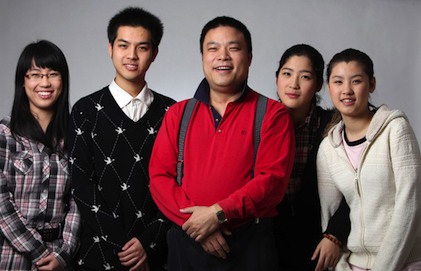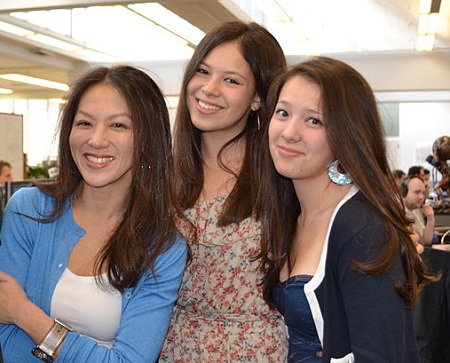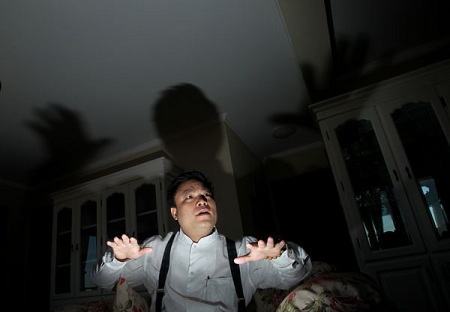December 29, 2011
The Fundamental Error Of Parenting: What's The Difference Between a Tiger Mom and A Wolf Dad?

apparently, the secret to success is single parents
From NPR:
Tiger Mom Amy Chua... became an overnight sensation in the U.S. this year when she wrote about her tough parenting style. But she looks like a pussy cat next to her
mainland Chinese equivalent, "Wolf Dad" Xiao Baiyou.
"Wolf Dad" wrote a book called Beat Them Into Peking University.
Xiao, 47, describes himself as the emperor of his family. As such, he's laid down an extraordinary system of rules for his children.
"I have more than a thousand rules: specific detailed rules about how to hold your chopsticks and your bowl, how to pick up food, how to hold a cup, how to sleep, how to cover yourself with a quilt," Xiao says. "If you don't follow the rules, then I must beat you."
The last parenting book I read was The Road. I'm not sure that counts. I only got a quarter through it, but its principle advice appears to be to take all of your instincts and the collected wisdom of every movie ever made and do the exact opposite. This is terrible advice.
For my money: this Xiao Baiyou is a nut. But whether this guy is a nut or not is not as important to you as what the media constructicons want you to think he is.
I.
What you noticed first about this story is that he beats his kids and they go to Peking University. You did this because you assumed the story was a news story and were looking for information, and not a media construction showing you a facade. What does the journalist want to be true?
Instead, what you should have noticed first, right off the bat, is that the story explicitly juxtaposes this man with Amy Chua. That's the fulcrum of the story, it tells you what your frame of reference is supposed to be. The point is NOT that he beat his kids into Peking University, the point is for you to compare him to Amy Chua and no one else.
Amy Chua was called a terrible mom for being hard on her kids, but if she had been a dad the state would have sent in the police and Battle Hymn Of The Tiger Dad would not exist. It doesn't exist, which is my point. She was able to publish because her audience-- e.g. the readers of the WSJ where she first and exclusively published an excerpt of her book-- like to hear the words "college" and "success" and "how", but to soften it from mean parenting to tough parenting you have to make it all come from a woman, especially a non-American one. Rule #1 of stupid people trying to make sense of the world: the culture you know nothing about has all the answers.
Then to reinforce Amy Chua's methods as the gold standard for all the other demos who previously hated her, an alternative standard that goes too far must be created to appall everyone into agreement. One year after Chua went platinum, here it is. "Well bless my heart, beatings?! I know I don't like that method of Chinese parenting! And Amy's daughters are all so poised and pretty, not like those porphyria drones he has solving Hamiltonians in the basement."
Note the four key differences in the story:
1. He's physically abusive, so the audience understands him to be hatable.
2. Not American, but Chinese, in China. China = uncivilized. Hatable.
3. His story appears on NPR, Slate, mommy blogs, not on the WSJ. This is not an audience weighing the merits of a yardstick to the knuckles, they prefer passive techniques like evolutionary psychology and chemical coercion. Man acting like a man, father like a father? Hatable.
4. Amy Chua is a Harvard law professor, while Xiao Baiyou is a real estate mogul. Hatable.
With this information, the reader is now invited to choose which of the two images represents an American success story:
a.

b.

II.
Question: what kind of a person reads parenting books? I'm not being critical, I'm asking. Do the readers feel they are failing and need some advice? Or are they just looking to hate someone and are willing to pay $23.95 for the ammunition? I can see that someone might see the book and say, "hmm, I'd like my child to get into Peking University, let's see what he has to say," but that thinking betrays a cognitive error that both makes these books useless to you and is the reason you need such books: you don't think there's anything wrong with your parenting, you think you just need some helpful tricks.
Hence the popular parenting books/blogs aren't for special populations like Raising The Autistic Child or My Kid Saw A Gorgon, What Now? These are ordinary kids being raised by parents who are worried about what shows are appropriate for kids, but not about the commercials. "What? He's 7. It's not like he's actually going to go buy an Acura." You've failed.
"Good" parenting, apparently, is trying techniques on your kid that were never used on you, even though you still turned out just fine. "I think TV is bad, I won't let my kids watch it." Outstanding. But how do you explain how you watched 5 hours of TV a day for thirteen years straight and still turned out ok? Think it over for a moment. You'll never admit the answer: because you're different. You succeeded despite the TV.
But look around: everyone you know over 30 also did fine despite the TV, no lawyer ever says, "Your Honor, my client saw every episode of Bosom Buddies and McHale's Navy, I move for dismissal." Which is why I am telling you: TV is bad for the kid, but that thinking is much worse.
So too: sugary cereals, bullying, Playboys. None of those things are good for kids, I am not saying to expose your kids to them. But thinking that they will be worse for your kids than they were for you is the fundamental, narcissistic error of parenting. "My kids are weaker than me." Then humanity is doomed.
I know many white doctors who have their kids in Mandarin classes. Did that help them become doctors? "I want them to be able to compete." With whom? Mandarins? Seriously, what world do you envision in which Mandarin is the deciding talent, except working in Mandaria? Which is great if that's what they want to do, great if the kid is interested, but otherwise is this really how you're plotting excellence? "It also teaches you to think logically." So does actual logic. "It looks good on a college application." Everyone hates you.
Part 2 here.
My Amy Chua post
http://twitter.com/thelastpsych
44 Comments